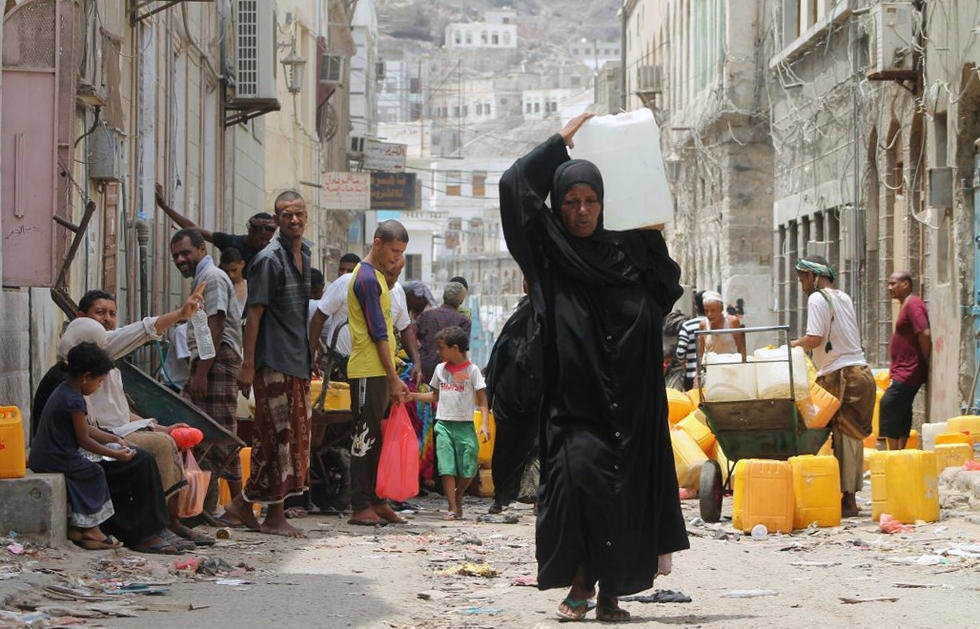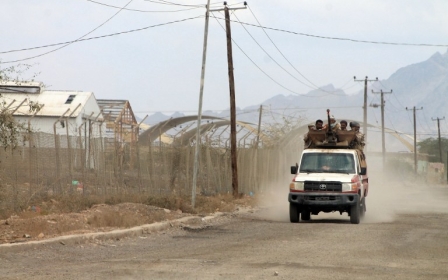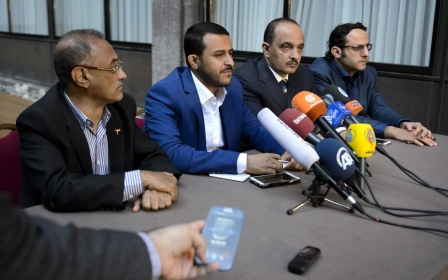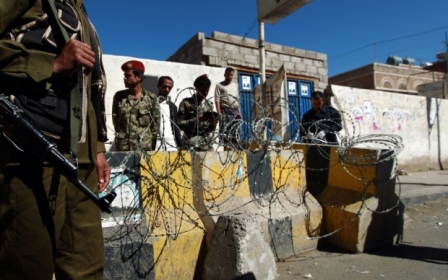An invisible killer on Aden’s streets

After the Popular Resistance managed to expel the Houthi fighters from Aden in July, regular life gradually started to return to the city.
Quiet has descended on the streets once filled with the sounds of gunfire and explosions. Petrol and food, at one time only available on the black market, are once again on sale.
If you walk the streets of Aden, previously filled with Houthis, you will hear neither clashes, nor airstrikes in the city, but you won’t see people either.
Despite the apparent peace returning to Aden, locals are still reluctant to return to areas of the city once held by Houthi fighters – fearing an invisible killer will claim their lives where the bullets and bombs failed.
In the past week, about 10 people have been killed and more than 80 injured by landmine explosions in Aden, according to the head of the health office in the city, Al-Khadher Laswar.
New MEE newsletter: Jerusalem Dispatch
Sign up to get the latest insights and analysis on Israel-Palestine, alongside Turkey Unpacked and other MEE newsletters
Laswar told Middle East Eye that there is not an exact figure available for the causalities of landmines, but that the toll increases every day.
Essam al-Shaeri, the under-secretary of the Aden-based Sah Foundation for Defending Rights and Freedom, told MEE that Houthi fighters had planted the landmines in areas across Aden, such as Dar Saad and al-Muaala, while they were under the group’s control.
Silent war
After the Popular Resistance expelled the Houthis from the city, the undetonated and unmarked landmines began to rip into the civilian population who were brave enough to return home, he added.
Yemen Executive Mine Action Center (YEMAC) does not work in Aden nowadays, meaning all of the landmine engineers in the area are volunteers, and do not work under the management of the centre, said Ali al-Qadri, an engineer at YEMAC currently based in Sanaa.
"It is a kind of adventure that the landmine engineers work without plans from their administration, but helping people is a very important thing and they cannot ignore someone who needs their help," al-Qadri told MEE.
He said that three landmine engineers had been injured in the past week in Aden, adding that several engineers were still working to detect the landmines that were causing Aden’s silent war.
"The landmine engineers detected dozens of landmines during the last week but the danger is still there as the landmines were planted everywhere in the city and engineers do their best to detect them but they cannot finish in one or two months and this task needs a long time," he said.
Fear of returning
Because of the landmines, many people who live in the areas which were under the control of Houthis are afraid to return their houses.
Amal Ayash, 35, moved from al-Muaala to al-Sheik Othman neighbourhood in Aden in an attempt to keep herself safe from the fighting and now she is one of the area’s former residents who fear returning home.
"The clashes stopped in the city, but the war is still ongoing as these landmines that Houthis planted can kill dozens of people and they also make people fear to live in the area that Houthis took over, so this is worse than the war," Ayash said.
She added that in her area of al-Muaala more than five landmines exploded in the past week.
Ayash is very pessimistic about the possibility of Aden future becoming a peaceful city as it used to be before the war.
She said that she hopes the Saudi-led coalition will send engineers to clear Aden of the landmines that make any chance of peace impossible.
Military presence continues
Even though the war stopped between the Popular Resistance and Houthis in Aden, military vehicles remain in every street in the city, a further sign to citizens that it is not safe to return.
"I know that there is no war these days, but when I see the military vehicles near to my house in Dar Saad, I cannot trust that this will not harm me, so I cannot return to my house," said Ali al-Daas, an Aden resident who is also seeking safety in Aden’s al-Sheik Othman.
The Popular Resistance has placed military vehicles in every street to guarantee that the Houthis cannot return to the city, said Maged Al-Shoaibi, a member of the media team of the Popular Resistance in Aden, adding that citizens often fail to grasp the reason for the heavy armed presence in their city.
"These military vehicles will not remain in the streets forever but Aden [is still in the aftermath of] war in this period, so there should be a procedure to ensure that Houthis cannot attack the city, and then the military vehicles will come back to their camps," he said.
Hope on the horizon
The landmines and the soldiers mean that the people of Aden still see their city as under siege, but there are some positives to come from the expulsion of the Houthis.
Ayash told MEE that basic goods are once again available in Aden's market at reasonable prices, effectively ending the need for a black market.
"Most of the people in Aden do not have money to buy basic goods, that is why the price is not expensive and most of the people are waiting for the popular resistance to provide them with the basic goods,” she told MEE.
Last week, humanitarian relief ships started to arrive in the port of Aden carrying food, medical supplies and oil derivatives – further easing the woes of those who had braved a return to the city.
"One litre of petrol costs YR75 ($3.50), while people can get wheat and other basic goods for free from the Popular Resistance. It is responsible for the distribution of the humanitarian aid," Ayash said.
One litre of petrol costs YR150 ($7) in Sanaa, double the price of fuel in Aden, and price of the staple foods is also higher in the capital.
In addition to this, the Yemeni government, based in Riyadh, said on Sunday that all relief ships should anchor in Aden, which is under the control of the Popular Resistance, instead of al-Hodeida, which remains under the control of Houthi fighters.
Al-Shaeri of the Sah Foundation for Defending Rights and Freedom told MEE that the government’s decision was good, but a plan is needed for the distribution of aid beyond Aden.
He added that Aden's residents had been under a Houthi siege for the past four months and so should feel sympathy with people in other provinces who are suffering the same fate and are living without basic supplies.
"The Popular Resistance and Aden's residents think that these ships are only for Aden, and we can see Aden is full of the basic needs, and this will lead to a crisis in the other provinces as everything will [only] reach Aden," he said.
Middle East Eye delivers independent and unrivalled coverage and analysis of the Middle East, North Africa and beyond. To learn more about republishing this content and the associated fees, please fill out this form. More about MEE can be found here.




